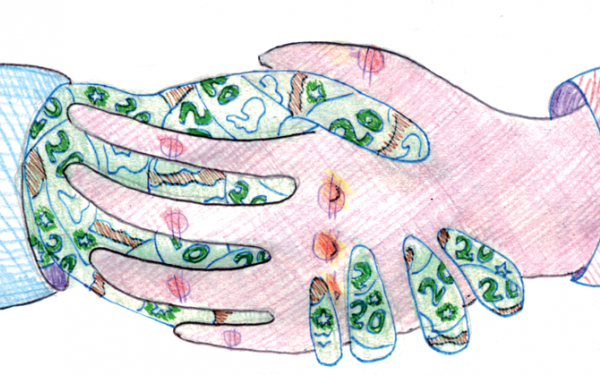CASA Update: Private Messages, Possible Honorarium Changes, and a New Constitution
Notes From the Board of Directors Meeting on Tuesday
A motion to read a board member’s private Facebook messages was entertained but failed to pass at a Commerce and Administration Students’ Association Board meeting on Tuesday night.
The failed motion targeted Rory Blaisdell, an independent director, for his possible involvement with leaked screenshots of a private CASA executive Facebook group.
CASA President Evan Pitchie made a presentation in regards to a previous Link article, which focused on how the CASA executive team handled a refund policy for their last Halloween party.
In his presentation, Pitchie made it clear that he wanted to figure out how the Board can learn from what happened with regards to the leaks and the media attention it received. He then asked Blaisdell if he knew anything about the leaks.
“Is there anything you can say about it,” Pitchie said, “or is this something that came up out of the blue and is just an unlucky situation that your name happened to be in the bottom right of the initial screen shots?”
Pitchie added that he wasn’t trying to single out Blaisdell, but no other Board member was asked if they leaked the messages during the meeting.
Blaisdell said he does not have access to the CASA executive page where the screenshots were taken. It emerged during the meeting that only 13 people are in that private Facebook group.
Anojan Kanagalingam, a student from the John Molson School of Business, originally posted the leaked screenshots around Dec. 4 to the public CASA-JMSB Facebook page, which has almost 16,000 members.
To prove his innocence, Blaisdell offered to have a neutral third party, like the Dean of the JMSB or the Dean of Students, to read his private messages with Kanagalingam.
A motion to have the chair of the Board meeting, Omar Riaz, read these messages instead failed. Blaisdell objected to this motion repeatedly, calling it a violation of his right to privacy.
To conclude the approximately 40-minute conversation, Pitchie said he didn’t want Blaisdell’s private messages to be read, while reiterating that he wasn’t trying to personally offend anyone.
“I need to know what happened so that I can propose a solution to the incoming president and incoming teams,” Pitchie said.
CASA’s upcoming elections are soon, with polling lasting from Feb. 13 to Feb. 17.
Changes to How CASA Gets Paid?
Under CASA’s current pay structure, $35,000 is set aside for executive pay.
Out of that amount, $3,000 is for the president, $2,000 for each of seven vice presidents, and $1,000 for each of four associate vice presidents. The presidents of the 14 subsidiary associations and committees can earn up to $1,000 each.
All eligible candidates for honorariums are paid based on a grade system. Grades are determined by the Board of Directors.
However, independent director Mikael Clement, said that in the last year, each person received a grade of 100 per cent. That’s with the exception of one CASA executive who received a grade of 90 per cent. Their name was not given. However, it was mentioned they received a lower grade in comparison to others because they had been absent in their role for some months.
Clement says he wants the “back-scratching” from the Board of Directors to stop, saying there is a lot of favouritism and obvious bias in the way they choose to grade each other.
He wants CASA’s five independent directors to be left to that duty instead.
“We as independent directors, we feel that is much more fair,” he said. He argued that independent directors would be more capable of grading fairly because they tend to be less involved.
Independent directors are meant to represent JMSB students and ensure that the Board and CASA’s subsidiaries are held accountable and are working in the best interest of JMSB students.
“We will not back-scratch because we don’t hang out on the 4th floor everyday, or go to all the same events,” Clement said. “This is really a way to eliminate the subjectiveness of what was happening last year.”
In the same discussion, it was agreed that CASA’s policy committee will write clear instructions on what criteria the Board of Directors will use to measure the performance grade of each CASA executive.
Whether or not CASA will consider Clement’s proposal is yet to be determined.
CASA Constitution
CASA is planning to rewrite some sections of its constitution. According to their president, some parts of the constitution are not in accordance with the law. He also said there are some sections that contradict each other.
Pitchie did not give any specification on the parts of the constitution that are illegal or contradictory, saying it was not necessary since the topic was brought up at a past Board meeting.
The suggestion to rewrite their constitution was made to them by their lawyer.
It was agreed that the rewrite would be finished by May 2. Later, JMSB students will vote to ratify those changes at their year-end general assembly.
This article has been updated.

_copy_900_574_90.jpg)
_600_832_s.png)

_600_375_90_s_c1.jpg)

_600_375_90_s_c1.jpg)
4_600_375_90_s_c1.jpg)